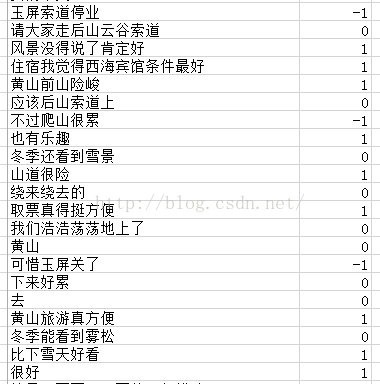【R语言】文本挖掘-情感分析
做中文文本挖掘一定会看到Rwordseg包,但是这是使用R以来遇见过最难安装的一个包,没有之一!!(可能将来还会遇见之二,毕竟本主还处于菜鸟级别)
低版本安装办法如下,曾经用R2.8的时候安装成功过,but,用R3.2.4就fail了
install.packages("Rwordseg", repos = "http://R-Forge.R-project.org")
install.packages("Rwordseg", repos = "http://R-Forge.R-project.org", type = "source")解压缩,copy到R的library文件夹里。成功了!!
library(Rwordseg)
segmentCN('我昨天买了10斤苹果',returnType = 'tm') 以下是对某景区点评内容的情感分析。
library(rJava)
library(Rwordseg)
setwd("D:\\Documents\\work\\myself_learn\\情感分析\\ntusd")
###################获取点评数据###################
p_comment_data<-read.csv("1黄山风景区_3.2.3. 语义分析(积极).csv",stringsAsFactors=FALSE)
n_comment_data<-read.csv("1黄山风景区_3.2.3. 语义分析(消极).csv",stringsAsFactors=FALSE)
comment_data<-rbind(p_comment_data,n_comment_data)
###################分句###################
data<-comment_data$comment
pattern_list="[,]|[,]|[.]|[?]|[?]|[:]|[:]|[~]|[~]|[…]|[!]|[!]"
#pattern_list="[.]|[?]|[?]|[~]|[~]|[…]|[!]|[!]"
replace_data1<-gsub(pattern="-", replacement="", data)
replace_data<-gsub(pattern=pattern_list, replacement="。", replace_data1)
split_data<-unlist(strsplit(replace_data,"[。]"))
del_num_data<-gsub("[0-9 0123456789]","",split_data)
is.vector(del_num_data)
del_num_data<-as.data.frame(del_num_data,stringsAsFactors=FALSE)
is.data.frame(del_num_data)
str(del_num_data)
names(del_num_data)<-"comment"
comment_sentence_data<-subset(del_num_data,comment!="")
#write.csv(split_data,"split_comment.csv",row.names = FALSE)
#write.csv(del_num_data,"del_num_data_comment.csv",row.names = FALSE)
#write.csv(comment_sentence_data,"comment_sentence_data.csv",row.names = FALSE)
#############################################
#negative <-readLines("ntusd-negative.txt",encoding = "UTF-8")
#positive <-readLines("ntusd-positive.txt",encoding = "UTF-8")
dict<-read.csv("dict_黄山.csv",stringsAsFactors=FALSE)
nega_data <-dict$negetive
posi_data<-dict$positive
insertWords(dict$insert_words)
#segmentCN('我去年自驾游,只是玩了大半个中国',returnType = 'tm')
comment_split <-segmentCN(comment_sentence_data$comment) #分词
head(comment_split)
#write.txt(comment_split,"comment_split.txt",row.names = FALSE)
#write.table(comment_split,"comment_split.txt")
comment_split[3]
comment_split[[1]]
comment_split[[1]][4]
is.list(comment_split)
getEmotionalType <- function(x,pwords,nwords){
emotionType <-numeric(0)
xLen <-length(x)
emotionType[1:xLen]<- 0
index <- 1
while(index <=xLen){
yLen <-length(x[[index]])
index2 <- 1
while(index2<= yLen){
if(length(pwords[pwords==x[[index]][index2]]) >= 1){
emotionType[index] <- emotionType[index] +1
}else if(length(nwords[nwords==x[[index]][index2]]) >= 1){
emotionType[index] <- emotionType[index] - 1
}
index2<- index2 + 1
}
#获取进度
if(index%%100==0){
print(round(index/xLen,3))
}
index <-index +1
}
emotionType
}
EmotionRank <-getEmotionalType(comment_split,posi_data,nega_data)
#getEmotionalType(commentTemp,positive,negative)
comment<-as.data.frame(comment_sentence_data$comment)
EmotionRank<-as.data.frame(EmotionRank)
emotionresult_data<-cbind(comment,EmotionRank)
write.csv(emotionresult_data,"emotionresult_data.csv",row.names = FALSE)
##############校验##############
positive[positive==commentTemp[[7]][6]]
negative[negative==commentTemp[[7]][6]]
commentTemp[7]
情感分析结果:
此算法比较适合简单句,对于双重否定的复杂句子处理能力比较差,有待优化。
哈哈,至少这次让我了解了情感分析的基本原理,曾经以为是一种非常高深的挖掘算法,然并卵,so easy,从此开始对所有精度不过关的情感分析,抱平和的心态。
参考网址:
http://www.tuicool.com/articles/amaY3iz
http://download.csdn.net/detail/hfutxrg/1063945
